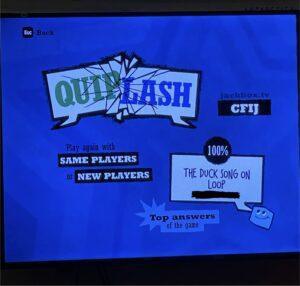
Quiplash is a party game developed and published by Jackbox Games, and it is available on virtually all major platforms. It can best be described as an Apples to Apples and Cards Against Humanity type of game with the difference being that players write their own answers to fill-in-the-blank type questions as opposed to selecting from pre-existing choices. Two people are assigned the same question, and everyone else votes for the answer they liked the best. Due to the other players being the judges in Quiplash, players are encouraged to come up with answers they think grab the attention of other players–usually through inside jokes and comedy–and this means that gameplay dynamics and strategies vary wildly from group to group.
While playing, I found that the number of players has an extreme effect on how answers are formatted. In a larger group, players must pander their answers to the wider audience with the hopes of receiving several votes. In contrast, a game with a small number of players (say, three) leads to players making hyper-specific inside jokes since a single player is judge, jury, and point-granter every time. In my opinion, Quiplash works much better with a large number of players as it is much harder to tell who wrote which answer and players do not feel that their fate is left to the arbitrary choices of one player.
This specific dynamic was on my mind a lot while playing Quiplash, and I believe that is because it relates very closely to a dynamic I noticed in my team’s P1 game: Mandate of Heaven. While trying to find a right balance of players, we found that the minimal number of players required for the game to function was not necessarily the minimal number of players required for the game to be balanced. In our case, we found that while the game could technically function with three players, it led to the Emperor being the weakest position and the two Advisors having an extreme advantage. This is very similar to what happens in a three player game of Quiplash, and the key difference is that the single Judge has extreme power while the other two players are bound to the whim of that Judge.
Moving away from how the number of players affects the gameplay of Quiplash, it is important to recognize how the players you are playing with impact the game as well. As stated previously, gameplay dynamics and strategies for Quiplash vary wildly from group to group. Critically, this means that there is a learning curve that every player experiences every time they play Quiplash with a new group for the first time. This learning curve also ensures that experienced players do not have too much of an advantage over newer players; even if an experienced player knows to target inside jokes, comedy, or mass appeal, they know just as much about how the group’s vibe will respond to an answer as a newer player does. This leads to a really fun gameplay loop of testing the waters with “safer” answers, seeing how other players react, leaning into the answers the other players seemed to like the most, and repeating as you become better and better at the game. Meanwhile, every other player (consciously or not) is doing the same thing, and players can never truly feel that their answer will win or be received well. If you ever play the game again with a different group, the whole cycle starts over again!


